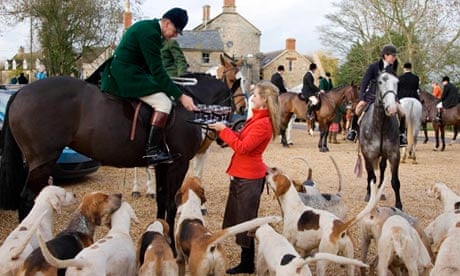Public opinion remains firmly against any attempt to lift the legal ban on fox and deer hunting, according to a survey timed to coincide with the year's biggest meets on Boxing Day.
Polling by Ipsos Mori shows no sign of opinion shifting in spite of a prolonged campaign by the Countryside Alliance and England's 320 registered hunts, which are now in their seventh year of "half life" – meeting with all the traditional finery and customs but barred from deliberately running foxes or deer to their deaths.
It found that 76% are against fox hunting being legalised, rising to 81% for deer hunting and 83% for hare coursing, based on a survey of 1,943 people.
Almost all hunts are due to ride on Boxing Day, with an estimated 45,000 supporters following the packs. Up to 250,000 others are expected to head out for a day in the country. The gatherings are always dependent on the weather, and forecasts suggest Boxing Day may fall between two fronts of rain moving in from the Atlantic.
The hunts will include a particularly large gathering at Chipping Norton in Oxfordshire, the base for 177 years of the Heythrop hunt, whose prominent enthusiasts include David Cameron and Rebekah Brooks, the former chief executive of News International.
Hopes of seeing celebrities are expected to swell crowds but the hunt is also a target for opponents of hunting after a successful cruelty prosecution two weeks ago. The hunt was fined £4,000 with £15,000 costs in a case brought by the RSPCA, whose £327,000 case underlines the resources now deployed against the traditionally well-heeled hunting lobby. The deliberate hunting and killing of a fox was monitored closely by hunt opponents, who could be heard on a video shown to Oxford magistrates shouting: "There's a kill," and: "Call the police."
Clips of the case are being used in campaigning against the Boxing Day fillip traditionally enjoyed by hunts, and the chief executive of the League Against Cruel Sports, Joe Duckworth, targeted the Heythrop in his seasonal message to campaigners. He said: "Prosecutions such as the Heythrop case make clear how many hunts in England and Wales show a total disregard for the law and for our wildlife. They want the Hunting Act repealed so they can to travel back to a time where hunting wild animals with dogs and ripping them apart was legal."
He said the Ipsos Mori results were a warning to the coalition not to "waste valuable parliamentary time" on the issue. He said: "They should listen to the majority of decent people in the country who consistently think that hunting should remain illegal and support the act. While hunts may want to spin their "lawful hunting activities" to the media, the uncomfortable truth is that cruel hunting and killing of wild animals in the name of 'sport' still goes on."
The Countryside Alliance has countered with a survey of its own, which suggests that morale remains high in the country's hunts. Most report more followers than in 2005 when the ban became law, as well as an increase in meets for 10% of the packs of hounds and an increased sense of support from local countryside communities.
Responses from 123 hunts found that a third had more subscribers and slightly more – 37% – reported a rise in membership of supporters' clubs. Only 6.9% carried out less hunting than before the ban, under 2% were regularly followed by hostile monitors and 85.2% felt able to offer a "fox control" service to local farmers.
Barney White-Spunner, executive chairman of the alliance, said: "It is immensely encouraging that seven years on from the ban, hunts are in good heart. This survey confirms their standing at the heart of many local communities and reminds us of the services they provide to farmers while operating under the restrictive conditions of the poorly written Hunting Act.
"On the downside it is quite clear that as well as the immense difficulties the law has brought for hunts, the police and in some cases the courts, it has had no benefit for the quarry species. In some areas alternative management methods have seriously reduced the fox population, whilst in the uplands the Hunting Act makes it nearly impossible for farmers to control numbers and protect their livestock.
"The Hunting Act was an attack on rural people rather than an attempt to improve animal welfare, which is why it has failed so spectacularly. We continue to campaign for a resolution to the hunting debate based on evidence and principle, not prejudice and political point-scoring."
